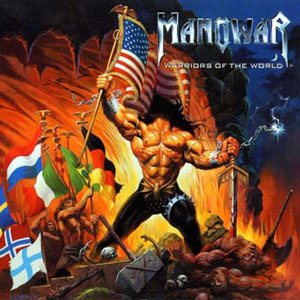I began assembling video clips of the Arab Spring with the intent of showing the Libyan conflict in the context of a larger regional event. Then I came across a CBS story about Chris Jeon, a UCLA student who lived with a brigade of Libyan rebels over the Summer:
“Their taste in music was interesting,” he said. “They’re in love with Justin Bieber, and when they said that I was like, ‘Oh are you serious?’”
They were serious. While the existence of an Arab "youth bulge" has been understood for years, Westerners seem unaware that young Arabs enjoy their iPods as much as any American teenager. These youth are not particularly interested in fundamentalism or caliphates: they want the freedom to rock, and woe to anyone who tries holding them back.
One genre that deserves special attention is heavy metal, which has enjoyed a boom in popularity across the region. From an Al Jazeera article by Mark LeVine about the stunning popularity of the old-school metal band Iron Maiden in Dubai:
And it is here that the group's unique philosophy offers interesting lessons for its large fanbase across the Arab and Muslim worlds - a young generation that is struggling to define a new role for themselves and the region in a globalised system that, much like the music business, seems rigged against them.
[...]
One of the main reasons why heavy metal, and Maiden in particular, are so popular across the Middle East and Muslim world is precisely because the genre, and the band, represents a "DIY," or do it yourself, philosophy that has allowed artists and fans to avoid the compromises that have plagued other genres like hiphop and mainstream rock.
From the Persian Gulf to the Atlantic Ocean, the Middle East has seen an explosion of metal bands. Many are restricted to basements, but that doesn't stop them from sharing their music on the internet and raising huge fan-bases. In fact, the oppression only seems to encourage them:
Growing from the very real repression and devastation faced in these lands, metal of all varieties is thriving from North Africa to Pakistan. As Moroccan metal founding father Reda Zine proclaimed: “we play heavy metal because our lives are heavy metal.”
The resulting fusion sounds both old and new. Middle Eastern metalheads have gathered in the hundreds of thousands, rivaling the Islamist rallies that induce so much hand-wringing in the West. In defense of the most basic freedoms they’ve had showdowns with dictators and fundamentalists. Sometimes, they win.
Is it possible that the Arab Spring owes as much to musicians as social media? I suspect the answer is yes, and not just because of Libyan guitar-warriors. Compare the Libyan street art on the left with the album cover on the right, for example. Does this look like dangerous sectarianism to you, or the persistent yearning of music-driven youth to engage the world and be part of it?















